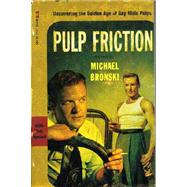Pulp Friction Uncovering the Golden Age of Gay Male Pulps
, by Bronski, Michael- ISBN: 9780312252670 | 0312252676
- Cover: Paperback
- Copyright: 1/14/2003
Long before the rise of the modern gay movement, an unnoticed literary revolution was occurring, mostly between the covers of the cheaply produced pulp paperbacks of the post-World War II era. Cultural critic Michael Bronski collects a sampling of these now little-known gay erotic writingssome by writers long forgotten, some never known and a few now famous. Through them, Bronski challenges many long-held views of American postwar fiction and the rise of gay literature, as well as of the culture at large. Michael Bronskiis the author ofCulture Clash: The Making of Gay SensibilityandThe Pleasure Principle: Sex, Backlash, and the Struggle for Gay Freedom.He has edited and contributed to many anthologies, has had essays published throughout the world, and teaches and lectures widely. He lives in Cambridge, Massachusetts. Long before the rise of the modern gay movement, an unnoticed literary revolution was occurring, mostly between the covers of the cheaply produced pulp paperbacks of the post-World War II era. Cultural critic Michael Bronski collects a sampling of these now little-known gay erotic writingssome by writers long forgotten, some never known and a few now famous. Through them, Bronski challenges many long-held views of American postwar fiction and the rise of gay literature, as well as of the culture at large. "I read through this book saying again and again, 'How did I miss this?' 'How did I manage not to know about this?'a sign that Michael Bronski has done a necessary job and done it well. Rarely is a book so educational also such a delight. By leaving the hallowed precincts of the 'literary,' Bronski lends a continuity heretofore lacking in many of our pictures of the development of gay fiction from World War II on."Samuel R. Delany, author ofTimes Square Red, Times Square BlueandThe Motion of Light in Water "I read through this book saying again and again, 'How did I miss this?' 'How did I manage not to know about this?'a sign that Michael Bronski has done a necessary job and done it well. Rarely is a book so educational also such a delight. By leaving the hallowed precincts of the 'literary,' Bronski lends a continuity heretofore lacking in many of our pictures of the development of gay fiction from World War II on."Samuel R. Delany, author ofTimes Square Red, Times Square BlueandThe Motion of Light in Water "Out of the shadows, into the sheets! Between the covers of gay pulp fiction, Michael Bronski finds forgotten treasures, presenting juicy excerpts and his own wise insights into this neglected bit of literary history."Jonathan Ned Katz, author ofLove Stories: Sex Between Men Before HomosexualityandGay American History "A wonderful book, a sexy, funny, looney-tune work of social history that rewrites the recent past. It's a celebration of the poetry of pulp as well as the truth of pulp. I cannot remember the last time I learned so much while having so much fun."Christopher Bram, author ofFather of FrankensteinandThe Notorious Dr. August "Noting research that included reading 'just over 225 novels,' cultural critic Bronski (The Pleasure Principle) delightfully chronicles gay pulp novels from their emergence in the late 1940s through the post-Stonewall era in this expansive, exhaustively researched amalgam of fiction and gay history. In the earliest novels, homosexual characters were often drawn as angst-ridden men living hideaway lives. These mild tales gave way to the more outrageous and sexually intrepid plot lines of the 1950s and early '60s as gay male pulps gained momentumtypical is a locker-room fantasy scene fromJay Little's MaybeTomorrow. As the 1960s progressed, fiction grew bolder in form and content. Richard A







